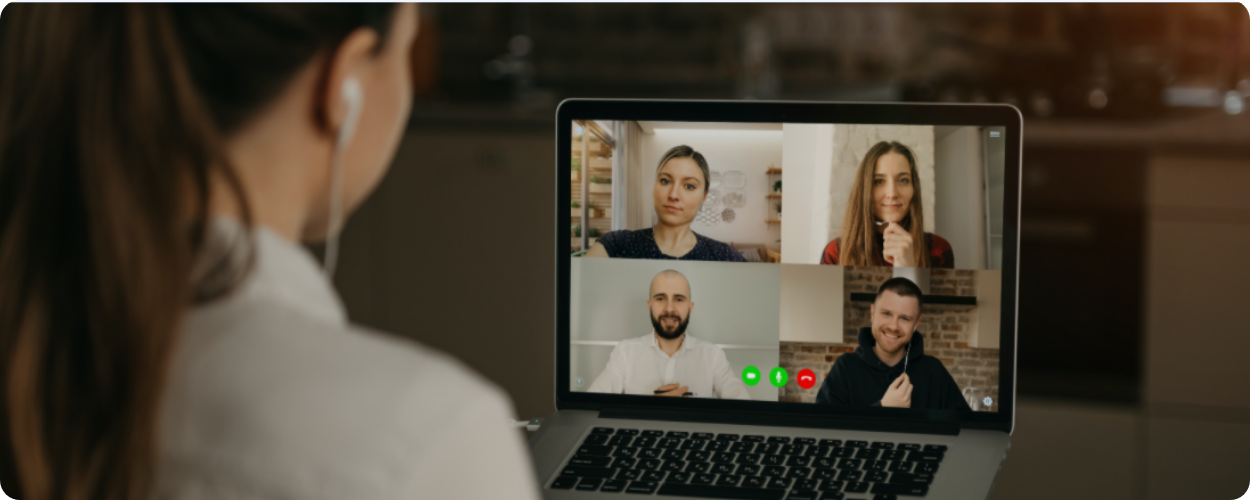REMOTE WORK
Remote Working Survival Guide

It is hard to go home from home-office
Almost everyone has been taking part in an unprecedented experiment through the Coronavirus pandemic – working from home on an unseen scale.
For many companies, as well as managers and employees, it has been the first experience with a remote work style. But the past few months have proven that companies can make remote working work. As it turns out, many studies even show that remote employees are more productive than regular office workers. Companies across industries are deciding on how to manage their offices in the upcoming months. Many (even the largest corporations such as Twitter) have announced their employees will be allowed to work from home “forever. “
But there is a catch. Remember that part about remote employees being so productive? There is a price to pay. In many ways, studies have shown that remote jobs are even more stressful than the traditional 9-to-5 ones. In reality, data points to the fact that remote workers often find it hard to achieve work-life balance and are more prone to overworking and burnout.
Given all the regularly highlighted pros of working remotely – such as no commute, office gossip, office politics, or overall buzz – how can that be? And even more importantly – what can you do to make home-working work for you? Here are some people science-backed tips & tricks we have been using in the office to remain sane even during these challenging times.
Personal (ir)responsibility
Many employees take entrusted freedom from the employer as a commitment. I find myself guilty of this one. We tend to worry that colleagues or managers might think we are misusing home-office for personal free time – so we opt to work even harder.
Helpful tips:
Plan your goals and tasks as planning can greatly reduce your stress quotient. Formulate a feasible plan and schedule your work just as if you were in the office.
There are only so many hours in a day. Before stretching your already imaginary working hours, focus on prioritizing each of your activities based on both urgency and importance. Apart from your daily schedule, think about how your everyday activities fit into your weekly goals. Watch out for systematically overloading yourself in the long run. Despite it seeming like a responsible thing to do for the business, it is incredibly irresponsible towards yourself. After all, you signed up for a marathon, not a sprint.
24-hour (working) day
When working from home, we get to save time on our daily commute. Therefore, many of us start working earlier than if we were to travel to the office. Similarly, there is no such thing as the end of working hours.

Working late nights for many remote workers is a commonly applied practice despite mounting concerns for adverse health outcomes coming from sleep displacement. In many cases, these extreme hours are the only time with no buzz in the household, and one can finally focus on work. Yes, I am talking about you, my sweet yet unreasonably loud neighbor. If this practice fits best into your schedule, so be it. But when your late-night emails start disrupting your biorhythm clock, it might be time to reconsider your plan to avoid these abrupt transitions.
Frequently, this also leads to others thinking you are available anytime, whether it be 6 a.m. or midnight. It might seem OK since “you’re not asleep anyway,” but you might get reminded continuously of work even during your downtime. That can compound more work-related stress.
Helpful tips:
Start by crafting your schedule to find a balance between your personal preferences and your business’ needs. Figure out what time in a day, you are the most productive and schedule your work accordingly.
Set clear “availability rules” and share these with your colleagues. Make it clear when you can - and - cannot be reached. Think team dashboard or a calendar where everyone from your virtual office can see when and how to contact other team members.
Also, try to track the time you spend on your activities. You might get surprised what a little helicopter view can do for your productivity.
Home traveler
It might seem like a total loss of time, but the journey to and from the offices serves a useful psychological purpose. It separates our personal and professional parts of the day but also plays its role in our psycho-hygiene.
As well as our bodies, our brains need some time to wake up. Our morning commute is a great time to slowly ease into the work mindset and do some work prospection - or in other words – do some thinking and planning about the day ahead. Breaks, lunch, and all the common workplace distractions also play their role in taking your mind off work.
Meanwhile, the evening is a good time to do some reflecting and to say goodbye to all the wrongs of the day – or simply said – clear our heads.

Helpful tips:
If possible, set-up a functional workspace. Create a dedicated space separated from the area where you relax. Whether your destination is Las Kitchenatas or even Porto Balconia, these short “travels” will create a sense of separation of your personal and professional time.
Create mindful daily rituals. These don’t have to be complicated but will add another layer between your on and off time. Think short walks, coffee on a terrace - or simply a lunch that you do not eat in from of your laptop. It may sound ridiculous, but many of us get so tied up in our work that we even forget to eat!
Home but not home
The chances are that your family will automatically assume that you are always available to talk, cook, or find that shoe that has been missing for ages since you are at home. The truth is that being distracted continuously may lead you to feel more stressed about not being productive. According to a study conducted by the University of California Irvine, it takes 23 minutes to regain your concentration after being distracted. All of this can lead to further focus issues, leaving you in an endless cycle.
Helpful tips:
Start with a conversation explaining to your family that when you are working from home, you are, in fact, still working. Communicate expectations and try to reinstate some of the dissolving boundaries.
Schedule breaks in your day. Although we would all love to be productive nonstop, it is not the case. Utilize these productivity valleys and get re-energized with the ones closest to you.
The truth is that being distracted continuously may lead you to feel more stressed...
Home traveler
It might seem like a total loss of time, but the journey to and from the offices serves a useful psychological purpose. It separates our personal and professional parts of the day but also plays its role in our psycho-hygiene.
As well as our bodies, our brains need some time to wake up. Our morning commute is a great time to slowly ease into the work mindset and do some work prospection - or in other words – do some thinking and planning about the day ahead. Breaks, lunch, and all the common workplace distractions also play their role in taking your mind off work.
Meanwhile, the evening is a good time to do some reflecting and to say goodbye to all the wrongs of the day – or simply said – clear our heads.
Self-care
Quickly skim through the career pages on any company website, and you will discover a range of perks designed to make work a fun place to be. Modern equipment, in-house café, office gym, super-fast internet, dog daycare (I know, right?) ... By definition, distant workers can hardly enjoy any of these; instead, they are somewhat more dependent on themselves to make their (home) office environment comforting and engaging.
Helpful tips:
Never underestimate looking after your mind, body, and soul.
Make your workspace a comfortable, safe & secure place to be. After all, you will be spending the vast majority of your day here. A proper chair, lighting, as well as a good cup of coffee, might be a perfect way to start. Even “taming your cables” can add extra comfort to your day. Personally, those can drive me crazy—big time. Also, do not be afraid to ask how your employer can support you with equipping your home office. You might be surprised.
When designing your workspace, eliminating distractions should be a priority. This is a place of focus and productivity.
Reward yourself whenever you reach a significant milestone – and remember, rewards don’t have to cost you anything. You can get pleasure out of the simplest things if you enjoy them.
Apart yet together
Loneliness can be incapacitating, which is a widespread problem among remote employees. When working from home, it is prevalent to miss social contact despite being surrounded by family. It is simply the difference in the nature of the conversations we have in the office. As they say, a problem shared is a problem halved. Having a sounding board, getting advice from someone who understands our job or office dynamics, or a simple, informal chatter - at a certain point, we all find ourselves missing some of these.
What’s more, some managers even fall victim to the old “out of sight, out of mind” issue challenging our sense of belonging. Settling into the new rhythms takes time, even to the most senior colleagues. Especially at the beginning, you might find some juggling between micro-managing (afraid that too much empowerment implies a lack of control), and being utterly missing in action (trying to avoid micro-management). Usually, this settles with time.
Helpful tips:
Stay in touch with your colleagues. Be proactive. Technology can be an excellent “bridge” to create a connection. Apart from purely professional chats and video calls, find time for some informal bonding. Get creative. Throw a remote “happy hour.” Have a virtual coffee. Even when you’re not at your best, a friendly face can offer a quick pick-me-up.
Not all things can be digitized, and sometimes an old pat on the back is all it takes to get you back at full speed. Whenever possible, try to find some time to meet your colleagues in person – and maybe have a little laugh over that ridiculous video call that happened just yesterday.

Work smarter, not harder
The right tools make all the difference when it comes to getting things done while working from home. Streamlining of critical information, cross-functional cooperation, alignment, and managing productivity and performance are commonly overlooked aspects of remote working.
LutherOne, the performance & collaboration ecosystem, combines people & data science with modern technology such as AI to radically advance people’s performance and potential. As the all-in-one remote worker’s toolkit, LutherOne addresses all the critical components of the new ways of working. Individual & team task management, communication, and collaboration through internal social media, workspaces & chat, multi-dimensional feedback, weekly engagement surveys, and much more.
Get started today to prepare your organization for the remote future.
